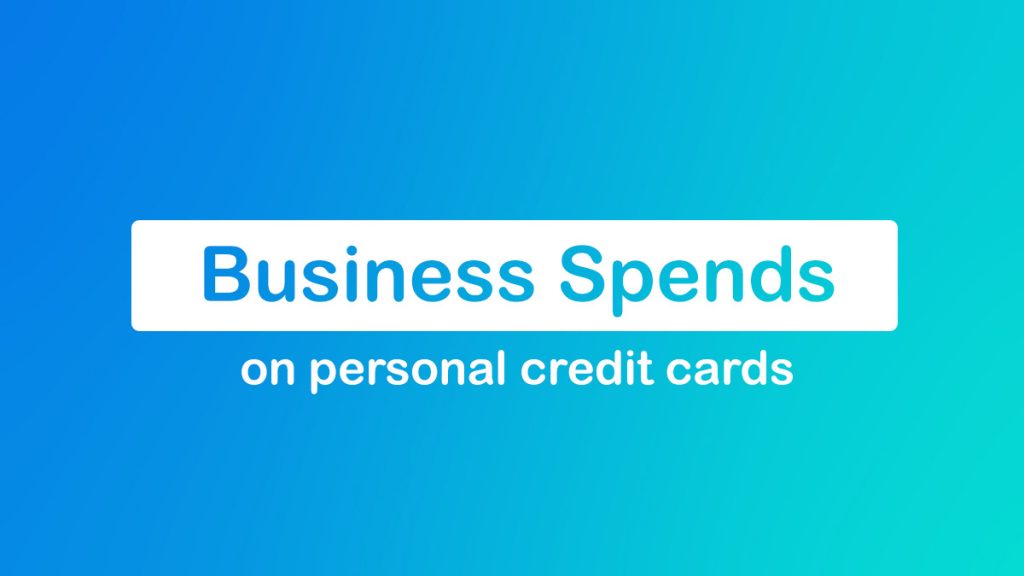Business expenses on personal credit cards are a common practice for many entrepreneurs and small business owners. While it may seem convenient to use your personal credit card for business purchases, there are important considerations regarding tax implications, financial management, and potential risks. This guide will explore the ins and outs of using a personal credit card for business expenses, providing valuable insights to help you make informed decisions.
Using a personal credit card for business expenses can offer benefits like earning rewards points or cashback, simplifying record-keeping, and providing a buffer during cash flow shortages. However, it also presents challenges such as potential tax complications, difficulty separating business and personal expenses, and increased exposure to financial risks.
Understanding Business Expenses on Personal Credit Cards
Many business owners use personal credit cards for business expenses, particularly when starting out. It’s a common practice, but it’s important to understand the implications.
Reasons for Using Personal Credit Cards for Business Expenses
Using a personal credit card for business expenses can be attractive for several reasons:
- Convenience: A personal credit card is readily available, especially when a business is just starting out and may not have established credit.
- Rewards: Personal credit cards often offer cash back, travel points, or other rewards programs that can be beneficial for business owners.
- Building Credit: Using a personal credit card for business expenses can help build a business owner’s personal credit score, which can be helpful for securing loans or financing in the future.
- Easier Approval: It can be easier to get approved for a personal credit card than a business credit card, especially for new businesses with limited credit history.
Tax Implications

Using a personal credit card for business expenses can have significant tax implications. Understanding how these expenses are treated for tax purposes is crucial for maximizing deductions and minimizing your tax liability.
Tracking and Categorizing Business Expenses
It is essential to keep accurate records of all business expenses incurred using a personal credit card. This involves carefully tracking each transaction and categorizing it appropriately. This information will be used to support your deductions on your tax return.
- Categorization: Expenses should be categorized based on their nature, such as travel, meals, supplies, advertising, or rent. This allows for accurate reporting and potential deductions on your tax return.
- Documentation: Keep supporting documentation for each business expense, such as receipts, invoices, or statements. This documentation is crucial for substantiating your deductions in case of an audit.
Deducting Business Expenses
When filing your tax return, you can deduct eligible business expenses incurred using your personal credit card. The deduction is claimed on Schedule C (Profit or Loss From Business) for sole proprietorships, partnerships, or S corporations.
Important Note: You can only deduct business expenses that are ordinary and necessary for your business. This means the expenses must be common and helpful in generating income for your business.
- Record Keeping: Maintain detailed records of all business expenses, including the date, amount, vendor, and category. This helps ensure accurate reporting and supports your deductions.
- Documentation: Gather all supporting documentation, such as receipts, invoices, or statements, to substantiate your deductions. This is essential for audits.
- Reporting: Report the business expenses on your tax return using the appropriate forms and schedules. Be sure to follow the IRS guidelines for reporting business expenses.
Financial Management and Reporting
Managing business expenses paid with a personal credit card requires meticulous organization and effective tracking to ensure accurate record-keeping and tax compliance. This section will provide practical tips for managing these expenses and creating comprehensive financial reports.
Organizing and Tracking Business Expenses, Business expenses on personal credit card
Keeping track of business expenses paid with a personal credit card is crucial for accurate financial reporting and tax deductions. Here are some best practices for organizing and tracking these expenses:
- Separate Business Transactions: Categorize and separate business transactions from personal expenses on your credit card statement. This can be done manually by noting the purpose of each transaction or using a dedicated business credit card.
- Use a Spreadsheet or App: Create a spreadsheet or use a dedicated expense tracking app to record all business expenses. Include details such as the date, vendor, amount, and a brief description of the purchase.
- Maintain Receipts: Keep physical or digital copies of all receipts for business expenses. This documentation will be essential for supporting your expense claims and tax deductions.
- Regularly Review and Update: Review your expense records regularly to ensure accuracy and identify any discrepancies. Update your records promptly to avoid confusion and ensure a complete picture of your business expenses.
Creating a Comprehensive Financial Report
A comprehensive financial report provides a clear overview of your business expenses, including those paid with a personal credit card. This report can be used for various purposes, such as tax preparation, financial planning, and performance analysis. Here’s how to create a comprehensive financial report:
- Gather Data: Collect all relevant data, including your credit card statements, expense tracking records, and receipts.
- Categorize Expenses: Categorize your expenses into meaningful groups, such as travel, marketing, office supplies, and utilities. This allows for better analysis and identification of spending patterns.
- Create a Summary Table: Create a summary table that displays the total expenses for each category. This provides a high-level overview of your spending.
- Analyze Trends: Analyze the data to identify any trends or patterns in your expenses. This information can be used to make informed decisions about future spending.
Example Financial Report
To illustrate the creation of a comprehensive financial report, let’s consider a hypothetical scenario.
Example: John, a freelance graphic designer, uses his personal credit card for business expenses. He tracks his expenses in a spreadsheet and categorizes them into travel, marketing, and office supplies.
John’s financial report for the month of January could look like this:
| Category | Total Expenses |
|---|---|
| Travel | $200 |
| Marketing | $150 |
| Office Supplies | $50 |
| Total Expenses | $400 |
This report provides a clear summary of John’s business expenses for the month, categorized by type. He can use this information to track his spending, identify areas for potential cost savings, and prepare his tax returns.
Record Keeping and Documentation
Maintaining accurate records of business expenses paid with a personal credit card is crucial for maximizing tax deductions and ensuring financial transparency. It helps you track your business spending, prepare accurate tax returns, and avoid potential audits.
Types of Documentation
Documentation is essential to support your business expense deductions. It provides evidence that the expenses were incurred for business purposes and are eligible for deductions. Here are some common types of documentation:
- Receipts: Receipts are the primary evidence of your business expenses. They should include the date, amount, vendor name, and description of the purchase.
- Invoices: Invoices are more detailed than receipts and typically include the vendor’s contact information, payment terms, and a description of the goods or services provided.
- Credit card statements: Your credit card statement shows the date and amount of each transaction, which is helpful for reconciling your records.
- Expense reports: An expense report summarizes your business expenses for a specific period and provides a detailed breakdown of each expense.
- Other supporting documentation: This could include meeting agendas, travel itineraries, or other documents that provide context for your business expenses.
Organizing and Storing Documentation
Organizing and storing your business expense documentation is critical for easy access and retrieval. Here are some tips for creating a system:
- Digital vs. Physical: Consider using a digital expense tracking app or software to organize and store your receipts electronically. This can help streamline the process and ensure your records are easily accessible. If you prefer physical records, use a file folder system or binder to keep your receipts and other documentation organized.
- Categorization: Organize your documentation by expense category, such as travel, meals, entertainment, or supplies. This makes it easier to locate specific receipts or invoices when you need them.
- Date-Based Filing: File your receipts and documentation by date to ensure that you can quickly locate expenses for a particular period.
- Backup System: Create a backup system for your records, either by using a cloud-based storage service or by making physical copies of your receipts and documentation. This protects your records in case of damage or loss.
Potential Risks and Challenges
While using a personal credit card for business expenses can offer convenience and flexibility, it comes with inherent risks and challenges that need to be carefully considered and mitigated. Failing to address these potential issues could lead to financial complications, tax penalties, and even legal trouble.
Potential Risks
The use of personal credit cards for business expenses can expose you to several risks, including:
- Mixing Personal and Business Finances: This can make it difficult to track expenses accurately and separate business income from personal income, leading to inaccurate financial reporting and potential tax issues.
- Exceeding Credit Limits: Using a personal credit card for significant business expenses can quickly push you towards exceeding your credit limit, resulting in high interest charges, late payment fees, and potential damage to your credit score.
- Fraudulent Activity: If your card is compromised or stolen, it could lead to unauthorized business expenses and significant financial losses.
- Lack of Business Protection: Personal credit cards typically don’t offer the same level of fraud protection or dispute resolution processes as business credit cards, which can leave you vulnerable in case of fraudulent transactions or disputes with vendors.
Potential Challenges
Apart from risks, using a personal credit card for business expenses can also pose several challenges, including:
- Reconciling Business Expenses: Accurately tracking and reconciling business expenses on a personal credit card can be time-consuming and prone to errors, especially for businesses with high transaction volumes.
- Limited Reporting Capabilities: Personal credit cards often lack the detailed expense reporting features found in business credit cards, making it difficult to generate reports for tax purposes or internal financial analysis.
- Lack of Rewards and Perks: Business credit cards typically offer more lucrative rewards programs and perks designed to benefit businesses, which are often absent in personal credit cards.
- Potential Tax Complications: Using a personal credit card for business expenses can complicate tax reporting and increase the risk of audits, especially if proper documentation and record-keeping are not maintained.
Strategies for Mitigating Risks and Addressing Challenges
To minimize the risks and overcome the challenges associated with using a personal credit card for business expenses, consider the following strategies:
- Separate Business and Personal Finances: Establish a dedicated business bank account and use a business credit card for all business expenses. This clear separation simplifies financial management, reduces the risk of mixing personal and business finances, and makes tax reporting more straightforward.
- Track Expenses Meticulously: Keep detailed records of all business expenses charged to your personal credit card, including receipts, invoices, and transaction details. This will help you accurately track expenses, categorize them for tax purposes, and avoid discrepancies during audits.
- Set Spending Limits: Establish a spending limit for business expenses on your personal credit card to avoid exceeding your credit limit and incurring high interest charges. This helps you maintain control over your spending and prevents unexpected financial burdens.
- Monitor Credit Card Statements Regularly: Review your credit card statements frequently to identify any unauthorized transactions or errors. Promptly report any discrepancies to your credit card issuer to minimize potential financial losses.
- Consider a Business Credit Card: If you frequently use a personal credit card for business expenses, consider obtaining a business credit card. Business credit cards offer features tailored for businesses, such as expense tracking, detailed reporting, fraud protection, and rewards programs, which can streamline your financial management and improve your overall business operations.
Alternative Solutions: Business Expenses On Personal Credit Card

While using a personal credit card for business expenses might seem convenient, it’s crucial to consider alternative methods that offer greater financial control, tax benefits, and protection for your business.
Exploring these options allows you to make informed decisions that align with your business needs and financial goals.
Comparison of Payment Methods
The following table compares and contrasts using a personal credit card with other methods of paying for business expenses:
| Method | Advantages | Disadvantages |
|---|---|---|
| Personal Credit Card |
|
|
| Business Credit Card |
|
|
| Debit Card |
|
|
| Cash |
|
|
Final Summary

Ultimately, the decision to use a personal credit card for business expenses depends on your individual circumstances and financial goals. While it can be a viable option for some, it’s crucial to understand the potential benefits and drawbacks, manage your finances responsibly, and prioritize accurate record-keeping. By taking the necessary steps, you can navigate the complexities of using a personal credit card for business expenses and make informed decisions that support your business’s growth and financial well-being.
Q&A
Is it legal to use a personal credit card for business expenses?
Yes, it is legal to use a personal credit card for business expenses. However, it’s essential to track and categorize these expenses accurately for tax purposes.
What are the benefits of using a personal credit card for business expenses?
Benefits include earning rewards points or cashback, simplifying record-keeping, and providing a buffer during cash flow shortages.
What are the drawbacks of using a personal credit card for business expenses?
Drawbacks include potential tax complications, difficulty separating business and personal expenses, and increased exposure to financial risks.
How do I track business expenses on a personal credit card for tax purposes?
You can use a spreadsheet, accounting software, or dedicated expense tracking apps to categorize and track business expenses on your personal credit card statements.
What are some alternatives to using a personal credit card for business expenses?
Alternatives include business credit cards, debit cards, and cash.
 Norfolk Publications Publications ORG in Norfolk!
Norfolk Publications Publications ORG in Norfolk!

